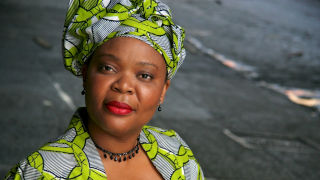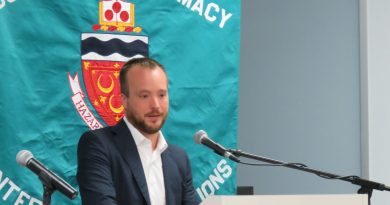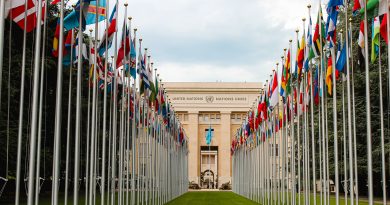Women, Peace, and Security: A Discussion with Nobel Peace Laureate Madame Leymah Gbowee
Hanan Abu Salih
Staff Writer
On April 7, the School of Diplomacy and International Relations at Seton Hall University hosted Madame Leymah Gbowee, 2011 Nobel Peace Prize Laureate and women’s advocate. Madame Gbowee has been appointed to the Seton Hall School of Diplomacy’s Board of Advisors and will act as a visiting scholar in the 2022-2023 school year.
The event was organized by the Center for Peace and Conflict Studies (CPCS) and co-sponsored by the United Nations Association of the United States and the Inclusive Security Organization. Sergio Vieria de Mello Visting Chair Rajaa Altalli and her team organized the event, with professor Fredline M’Cormack-Hale serving as the moderator.
The Speaker Series on Women, Peace, and Security (WPS) aims to demonstrate the effect that United Nations Security Council Resolution (UNSCR) 1325 has on involving women in peacemaking processes by highlighting the essential role they play as mediators and peacebuilders across the globe. Through the conversation, Madame Gbowee discussed the importance of successful implementations of WPS agendas and National Action Plans (NAPS), and how women’s movements and women leaders like her play an indispensable role in peacemaking and conflict resolution processes.
From an early age, while working as a young volunteer with The Lutheran Church in Liberia Trauma Healing and Reconciliation Program, Madame Gbowee learned how to work with the “enemy.” Her job was to care for the same young soldiers who were responsible for her people’s misery. She explained how that was when she decided to embark on her journey as an activist. Madame Gbowee went on to share her story in the 2008 documentary film “Pray the Devil Back to Hell” and her 2011 memoir “Mighty Be Our Powers.”
When Madame Gbowee and a group of women started the Mass Action for Peace campaign in Monrovia, they were not aware of UNSCR 1325, but still aligned with its core principles of participation, prevention, and protection. Madame Gbowee explained that these movements collaborated with the understanding that “war will not end war, just like we can’t fight fire with fire.” They defied the decision that banned them from joining peace negotiations and refused to be excluded from discussing peace processes.
Madame Gbowee said that they were hoping to dismantle the prevailing notion that “men made war and men should make peace.” She emphasized that women must be present at the negotiation tables when dealing with conflict or discussing peace agreements so that their narratives and voices can be heard. One accomplishment of the women’s movements in Liberia was their assistance in paving the way for the election of Liberia’s first female president, Ellen Johnson Greenleaf, in 2005.
Through her experience with conflict resolution and peace negotiations, Madame Gbowee identified three weaknesses in the implementation of WPS agendas (with UNSCR 1325) and NAPS. First, the absence of women in peace negotiations proves the lack of recognition of their talents and their intellectual ability by patriarchal structures. Recognition is required on local, national, and international levels, where women are needed in decision-making processes and leadership positions.
Second, National Action Plans or WPS agendas cannot be applied with a “one-size-fits-all” approach to all countries facing conflict. Locals should be involved in setting those agendas, as they best understand the reality of the situation and are aware of what solutions work best for them.
Third, funding is crucial for the fulfillment of the WPS agenda and should be included in governments’ national budgets for the implementation of Local and National Action Plans. Madame Gbowee emphasized the need to be realistic in setting a budget for these plans within a country’s financial means. In Liberia, for example, in 2019, the suggested budget for National Action Plan was $25 million, which was five times the budget of the whole Ministry of Gender. Madame Gbowee emphasized the importance of responding to these weaknesses to assist in the proper implementation of Resolution 1325.
“UNSCR 1325 is international law. Every country that joins the UN agrees, under Article 25, to carry out its decisions,” explained Madame Cora Weiss, one of the women responsible for drafting the resolution twenty years ago. She stated how she would have redrafted the resolution to avoid the use of “security” and instead have prioritized “sensibility” or “safety.” While she expressed the need for “security” to remain in the picture, Madame Gbowee agreed with the importance to redefine “Peace and Security” to have a more inclusive definition, emphasizing that peace is not just the absence of war or the overtaking of “the others” as men see it, but as the presence of conditions that dignify the lives of all.




